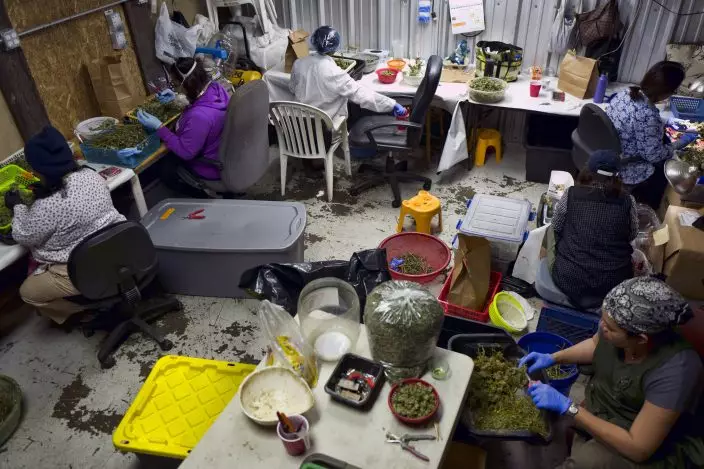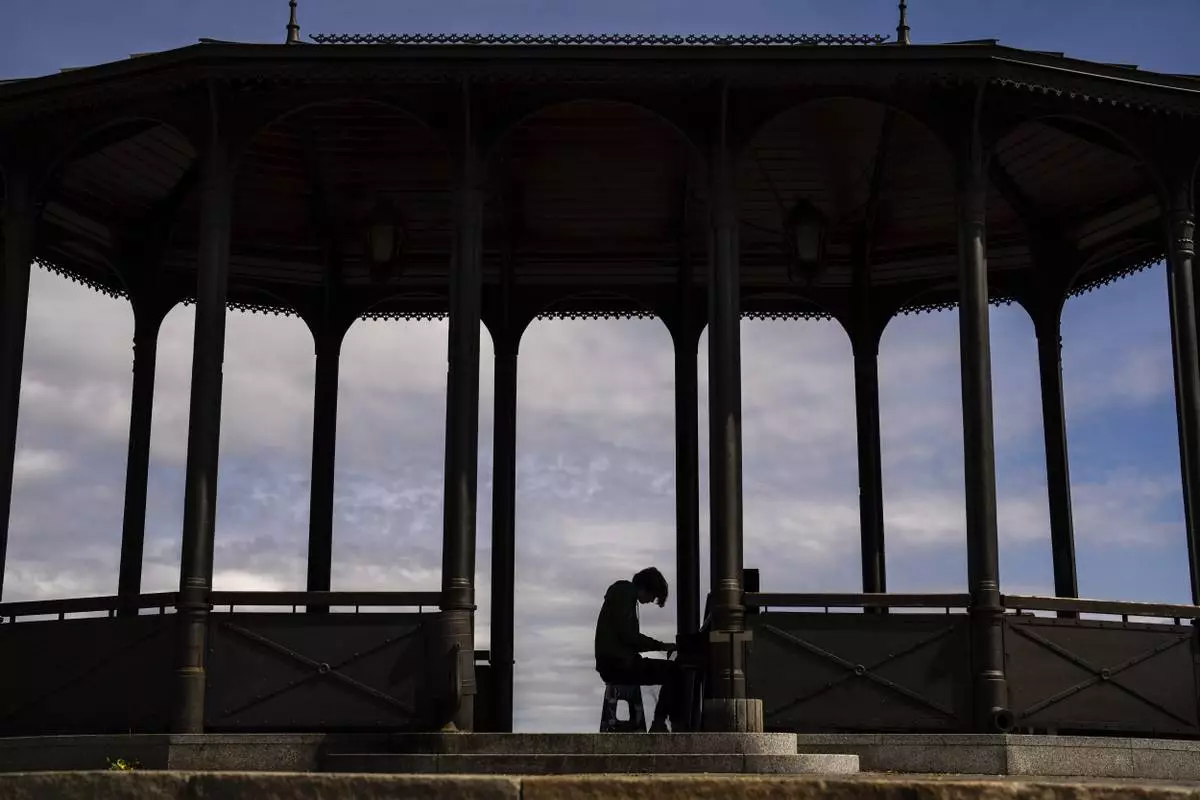Immigration authorities on Friday said that anyone with any involvement with marijuana, regardless of whether it's legal in the state where they live, can be denied citizenship because the drug is still illegal under federal law.
The announcement comes weeks after officials in Colorado, where recreational marijuana is legal, began warning residents that working for a dispensary or manufacturing operation could jeopardize their citizenship bid — even if those jobs are state-sanctioned.
The updated guidance from the U.S. Citizenship and Immigration Services states that people who use marijuana or are involved with it in any way fail to have "good moral character," a prerequisite for people who have legal permanent residence to gain American citizenship.

FILE - In this Thursday, April 4, 2019, file photo, a Cambodian cannabis worker trims marijuana flowers at Loving Kindness Farms in Gardena, Calif. Immigration authorities on Friday, April 19, 2019 said that anyone with any involvement with marijuana, regardless of whether it's legal in the state they live in, can be denied from citizenship because the drug is still outlawed by federal law. (AP PhotoRichard Vogel, File)
About two-thirds of states allow the use of marijuana for medical purposes, and 10 allow recreational use. Washington, D.C., also allows recreational use.
"U.S. Citizenship and Immigration Services is required to adjudicate cases based on federal law," spokeswoman Jessica Collins said in a statement. "Individuals who commit federal controlled substance violations face potential immigration consequences under the Immigration and Nationality Act (INA), which applies to all foreign nationals regardless of the state or jurisdiction in which they reside."
In Colorado, immigration attorneys say at least two green-card holders were denied citizenship because they worked or had worked in marijuana-related jobs. There are probably more, they say.

FILE - In this April 3, 2019, file photo, Oswaldo Barrientos stands in the doorway of a grow room at the marijuana facility where he works near downtown Denver. Immigration authorities on Friday, April 19, 2019 said that anyone with any involvement with marijuana, regardless of whether it's legal in the state they live in, can be denied from citizenship because the drug is still outlawed by federal law. (AP PhotoThomas Peipert, File)
Immigrants who apply for citizenship must first fill out a 20-page form known as the "N-400." It asks about prior work, family and criminal history, but it doesn't specifically ask if a person has used or worked with marijuana.
Julia Gelatt, a senior policy analyst for the Migration Policy Institute, said it's not likely that most people will disclose information about pot use. But she said the new policy could make some people nervous about applying.
"Whether or not it has a real impact is whether adjudicators decide to ask about it," Gelatt said.
KYIV, Ukraine (AP) — A Ukrainian court on Friday ordered the detention of the country’s farm minister in the latest high-profile corruption investigation, while Kyiv security officials assessed how they can recover lost battlefield momentum in the war against Russia.
Ukraine’s High Anti-Corruption Court ruled that Agriculture Minister Oleksandr Solskyi should be held in custody for 60 days, but he was released after paying bail of 75 million hryvnias ($1.77 million), a statement said.
Ukraine’s National Anti-Corruption Bureau suspects Solskyi headed an organized crime group that between 2017 and 2021 unlawfully obtained land worth 291 million hryvnias ($6.85 million) and attempted to obtain other land worth 190 million hryvnias ($4.47 million).
Ukraine is trying to root out corruption that has long dogged the country. A dragnet over the past two years has seen Ukraine’s defense minister, top prosecutor, intelligence chief and other senior officials lose their jobs.
That has caused embarrassment and unease as Ukraine receives tens of billions of dollars in foreign aid to help fight Russia’s army, and the European Union and NATO have demanded widespread anti-graft measures before Kyiv can realize its ambition of joining the blocs.
In Ukraine's capital, doctors and ambulance crews evacuated patients from a children’s hospital on Friday after a video circulated online saying Russia planned to attack it.
Parents hefting bags of clothes, toys and food carried toddlers and led young children from the Kyiv City Children’s Hospital No. 1 on the outskirts of the city. Medics helped them into a fleet of waiting ambulances to be transported to other facilities.
In the video, a security official from Russian ally Belarus alleged that military personnel were based in the hospital. Kyiv city authorities said that the claim was “a lie and provocation.”
Kyiv Mayor Vitali Klitschko said that civic authorities were awaiting an assessment from security services before deciding when it was safe to reopen the hospital.
“We cannot risk the lives of our children,” he said.
Meanwhile, Ukrainian President Volodymyr Zelenskyy was due to hold online talks Friday with the Ukraine Defense Contact Group, which has been the key international organization coordinating the delivery of weapons and other aid to Ukraine.
Zelenskyy said late Thursday that the meeting would discuss how to turn around Ukraine’s fortunes on the battlefield. The Kremlin’s forces have gained an edge over Kyiv’s army in recent months as Ukraine grappled with a shortage of ammunition and troops.
Russia, despite sustaining high losses, has been taking control of small settlements as part of its effort to drive deeper into eastern Ukraine after capturing the city of Avdiivka in February, the U.K. defense ministry said Friday.
It’s been slow going for the Kremlin’s troops in eastern Ukraine and is likely to stay that way, according to the Institute for the Study of War. However, the key hilltop town of Chasiv Yar is vulnerable to the Russian onslaught, which is using glide bombs — powerful Soviet-era weapons that were originally unguided but have been retrofitted with a navigational targeting system — that obliterate targets.
“Russian forces do pose a credible threat of seizing Chasiv Yar, although they may not be able to do so rapidly,” the Washington-based think tank said late Thursday.
It added that Russian commanders are likely seeking to advance as much as possible before the arrival in the coming weeks and months of new U.S. military aid, which was held up for six months by political differences in Congress.
While that U.S. help wasn’t forthcoming, Ukraine’s European partners didn’t pick up the slack, according to German’s Kiel Institute for the World Economy, which tracks Ukraine support.
“The European aid in recent months is nowhere near enough to fill the gap left by the lack of U.S. assistance, particularly in the area of ammunition and artillery shells,” it said in a report Thursday.
Ukraine is making a broad effort to take back the initiative in the war after more than two years of fighting. It plans to manufacture more of its own weapons in the future, and is clamping down on young people avoiding conscription, though it will take time to process and train any new recruits.
Jill Lawless contributed to this report.
Follow AP’s coverage of the war in Ukraine at https://apnews.com/hub/russia-ukraine

Ukrainian young acting student Gleb Batonskiy plays piano in a public park in Kyiv, Ukraine, Thursday, April 25, 2024. (AP Photo/Francisco Seco)












